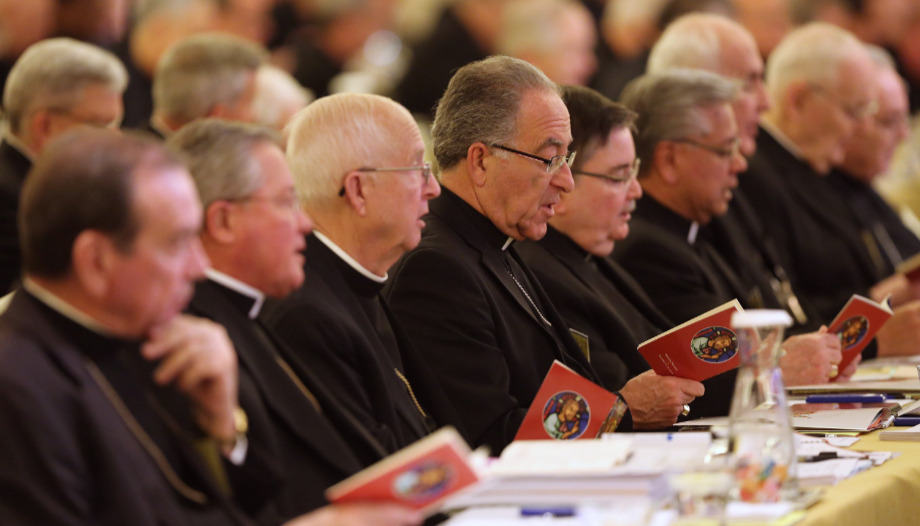The Plenary Assembly of the United States Conference of Catholic Bishops (USCCB) will be held in Baltimore, Maryland, November 14-17. The sessions will discuss the most important challenges facing the Church in the U.S., among them the Eucharistic Revival Initiativethe revision of the doctrinal document on the political responsibility of Catholics ("....Forming conscience to be faithful citizens"Jackson decision of the Supreme Court of Justice and the discussion of some causes of beatification and canonization.
The international themes of this Assembly will include the World Youth Day 2023, the Synod of Bishops, the war in Ukraine and the migration situation on the U.S.-Mexico border, among others. Christophe Pierre, followed by Archbishop José H. Gomez, Archbishop of Los Angeles, who will deliver his last address as president of the USCCB, concluding his term of office. During this meeting, the North American bishops will vote to elect new presidents, vice presidents and the heads of six committees.
The challenges of the new administration
The bishops who will form the new administration for the next triennium will have before them the challenges and hopes of the North American Church which were expressed during the synodal process that took place recently in the USA and whose conclusions were published in the "National Synthesis of the People of God in the USA Synod of Bishops 2021-2023". The document synthesizes the reports of the 178 dioceses and archdioceses of the Latin Church, the Personal Ordinariate of the Chair of St. Peter and the 18 Eastern Catholic eparchies present in the country.
This synodal process involved 700,000 people, who make up about 1% of U.S. Catholics (out of a total of 66.8 million Catholics). The document reflects the joys, hopes and lingering wounds in the American Church. The Synthesis notes that this synodal experience in the U.S. allowed for the rediscovery of "the simple practice of gathering, praying together and listening to one another" to discern responses to the challenges facing the Church, with the Holy Spirit as the principal agent in this exercise.
The wounds
Sexual abuse, division in the churchThe wounds reported by the participants in the synodal process were the polarization in the U.S., the absence of young people and the marginalization of ethnic and racial groups. According to the Synthesis, the most distressing wound is the effects of the sexual abuse crisis: "The sin and crime of sexual abuse has eroded not only trust in the hierarchy and the moral integrity of the Church, but has also created a culture of fear that prevents people from relating to one another," the text states.
Another persistent wound was "the experience of the deep division of the Church, which causes a profound sense of pain and anxiety. In that sense, many regions of the country perceived the lack of unity among the bishops of the United States and among some bishops (individually) with the Holy Father, a situation that was defined as a "source of grave scandal".
This division within the Church, which is fed by political polarization, also affects the celebration of the Eucharist. The differences in the way of celebrating the liturgy, the text specifies, "sometimes reach a level of hostility". In this area, the most contentious issue was the celebration of the pre-conciliar Mass. Other challenges identified in the synodal consultations were the marginalization of minority groups, the feeling of exclusion of young people and their absence from the Church: "Practically all the synodal consultations shared a deep sorrow for the departure of young people.
Hopes placed in the Eucharist
In spite of the many wounds that reveal a great desire for healing and communion, the participants in the synodal process agreed that the Eucharist is the source of hope, from which unity, community and the life of faith spring. Providentially, this year we are carrying out an initiative called "The Eucharist is the source of hope.National Eucharistic Revival"The program, a three-year program sponsored by the USCCB, aims to foster the knowledge, love and encounter of God's people with the source and summit of the Catholic faith.
This initiative will culminate with the National Eucharistic Congress in Indianapolis, Indiana on July 17-21, 2024. As the initiative's website states, "Scandal, division, sickness, doubt. The Church has withstood each of these throughout our history. But today we face them all at once. In the midst of these roaring waves, Jesus is present, reminding us that He is mightier than the storm. He desires to heal, renew and unify the Church and the world. How will He do this? By uniting us again around the source and summit of our faith: the Holy Eucharist."







